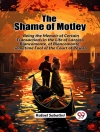In ‘Arminell: A Social Romance, ‘ Sabine Baring-Gould weaves a compelling narrative set against the backdrop of Victorian society, exploring themes of class disparity and the intricate dynamics of human relationships. The novel’s literary style is characterized by its vivid descriptions and rich character development, allowing readers to immerse themselves in the lives of the protagonists. Baring-Gould’s keen observations of rural life and social conventions reflect the broader societal changes of his time, inviting a critical examination of the Victorian ethos surrounding love, duty, and social status. Sabine Baring-Gould was a multifaceted figure, known primarily for his contributions to literature and folklore, as well as his devout religious beliefs. His experiences as an author, clergyman, and local historian informed his engagement with socio-political issues and instilled a deep understanding of human nature. This intricate knowledge is evident in ‘Arminell, ‘ where the interplay of personal ambition and social expectation becomes a poignant commentary on the status quo. For readers intrigued by the complexities of love and society, ‘Arminell’ offers a rich exploration of social romances that is as relevant today as it was in the 19th century. Baring-Gould’s masterful storytelling invites readers to reflect on the timeless questions of identity and human connection, making this novel a worthy addition to any literary collection.
عن المؤلف
Reverend Sabine Baring-Gould (1834-1924) was an English hagiographer, antiquarian, novelist, and eclectic scholar. His notable contributions span across various genres including theology, folklore, and fiction, with a prolific literary output that cemented his reputation as a versatile and learned man of letters. A Cambridge University graduate and ordained priest, Baring-Gould spent a significant portion of his life serving as a parish priest in Devon, where much of his writing reflects the region’s rich cultural tapestry. Among his celebrated works is ‘Arminell, a Social Romance’ (1890), a nuanced exploration of Victorian society and its myriad class divisions. The novel exhibits Baring-Gould’s acute social awareness and ability to critique the norms of his time through a compelling narrative framework. His literary style often combined a strong narrative presence, detailed pastoral imagery, and an underlying current of social commentary, which became a hallmark of his fiction. Baring-Gould’s legacy extends beyond fiction to authoritative texts on saints, including ‘The Lives of the Saints’, and his famous hymns, such as ‘Onward, Christian Soldiers’. As a scholar, he contributed extensively to the study of English folklore, penning the classic ‘Curious Myths of the Middle Ages’. His diverse body of work and his contributions to religious and secular literature render him a significant though often underappreciated figure in the canon of 19th-century English authors.












